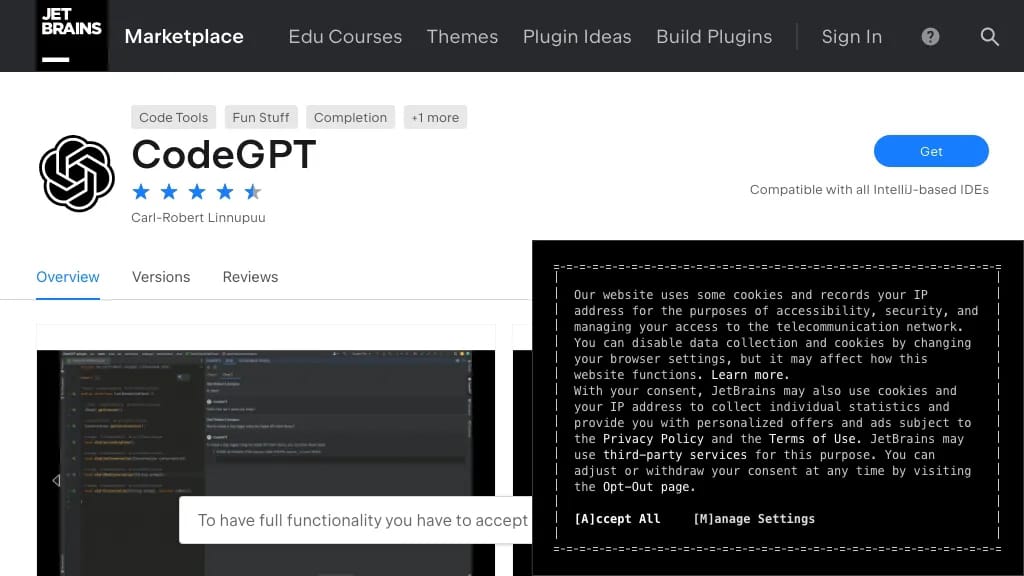
As the digital marketplace becomes more competitive, web development teams need every advantage. GPT‑4–powered tools are revolutionising coding, debugging, and optimisation workflows. Here are ten game‑changers your web development agency, or business, is likely to hear about when scouting for top-tier talent.
1. GitHub Copilot (GPT‑4 enabled)
This has been available as an extension in VS Code, JetBrains, and more. Copilot utilises GPT‑4 to autocomplete code functions, convert comments into working code, and even offer contextual suggestions. It autocompletes roughly half the time, and users report a significant boost in productivity by reducing documentation and coding overhead.
Why businesses care: Reduced dev time translates to faster project delivery and lower cost.
2. CodeGPT (IDE AI Assistant)
CodeGPT empowers your coding with a team of AI assistants. It brings GPT‑4o intelligence into your IDE, offering project scaffolding, debugging, and hints from Stack Overflow. This development platform improves productivity and helps developers write better code, acting as an intelligent teammate.
Why businesses care: Streamlined team onboarding and faster error resolution.
3. Tabnine
With GPT-4 foundations, Tabnine offers secure code completion, unit test generation, documentation, and refactoring across over 80 languages and major IDEs. It’s designed to be under the control of an engineering team.
Why businesses care: Maintains high code quality while ensuring consistency and documentation standards.
4. CodiumAI / Qodo
Focused on code integrity, CodiumAI (now Qodo) utilises GPT–4–powered agents to generate test cases, validate code correctness, and automate compliance checks. Its Chrome extension seamlessly integrates into code reviews, featuring advanced AI-driven validation workflows.
Why businesses care: Proactive defect prevention and faster compliance regulation.
5. ChatGPT with Canvas
Using GPT‑4’s Canvas feature, developers can co-edit multiple files visually, debug UI in-browser, and preview live code. It’s like having an AI pair programmer built right into your browser session.
Why businesses care: Reduces feedback loops between designers and devs and promotes visual QA early in development.
6. GPT Pilot
GPT Pilot is an experimental GPT‑4–based agent that can generate a full app prototype, reportedly automating up to 95% of tasks, with developer oversight.
Why businesses care: Rapid prototyping utility, especially valuable for startups testing MVPs or agencies pitching clients.
7. Web4AI (GPT‑4 Refactoring Tool)
A web tool that uses GPT‑4 to help developers refactor, comment, and generate unit tests for their code, bundling everything into a portable ZIP file. Web4AI is great for tidying up legacy modules and improving code quality.
Why businesses care: Saves on technical debt, improving maintainability and security of older codebases.
8. Overchat AI (Multi‑Model Gateway)
This platform provides simultaneous access to GPT‑4.1, Claude, Gemini, and more. Developers can swap models based on file size, language, or budget.
Why businesses care: Flexibility to choose best-fit LLMs for specific projects—cost‑efficiency meets performance.
9. Claude 4 Sonnet / Opus (Coding‑Focused LLM)
Anthropic’s Claude 4 variants, powered by GPT‑4 tech, deliver strong performance on code benchmarks like SWE‑bench, often surpassing GPT‑4 variants in accuracy.
Why businesses care: Ideal for complex refactoring, deep debugging, and reasoning over large codebases.
10. IDEA: GPT‑4o–Enabled Eclipse Theia
Eclipse Theia’s open-source IDE now includes AI code assistance, compiler-like with GPT‑4o tech, offering a privacy-friendly Copilot alternative.
Why businesses care: Enables agencies to build secure, in-house coding assistants with full control over data governance.
Why This Matters to Business & Tech Owners
- Reduced time to market – Every minute saved in coding scales into faster deliverables and revenue realisation.
- Enhanced quality & consistency – Automatic test generation and refactoring reduce technical debt and elevate standards.
- Flexibility meets scalability – Swappable LLM backends allow for optimisation based on project scope and budget.
- Talent attraction – AI‑equipped workflows retain top developers who seek modern tech stacks.
- Risk mitigation – Agents like Qodo and Tabnine are designed with security, license compliance, and documentation in mind.
Tips for Choosing & Implementing GPT‑4 Tools
- Match tools to project complexity: Use lightweight autocomplete (Copilot, Tabnine) for standard builds; deploy Claude 4 or CodiumAI for security-heavy or compliance-sensitive tasks.
- Prioritise IDE integrations: Tools embedded in VS Code or IntelliJ reduce operational resistance among developers.
- Set governance boundaries: Define access to sensitive code, especially with cloud-based AI assistants. Privacy matters.
- Invest in process change: Train teams to write effective prompts and review AI output proactively.
- Measure & adapt: Track time saved, defects reduced, and developer engagement to optimise tool mix and ROI.
In Summary
GPT‑4–powered coding tools are no longer novelty, they’re becoming core infrastructure for cutting-edge web development. Whether it’s GitHub Copilot or Claude 4, each tool brings unique value: speed, accuracy, quality, or autonomy. For business stakeholders and tech owners, adopting the right AI-enhanced stack can translate directly into cost savings, speed to launch, and developer satisfaction.
Evaluate your current dev workflows, identify bottlenecks, and pilot one or two tools, preferably starting with IDE-integrated solutions like Copilot or CodeGPT. From there, progressively layer in security and automation tools like Tabnine and Qodo.
The result? A future‑ready, AI‑augmented web development team ready for 2025 and beyond.